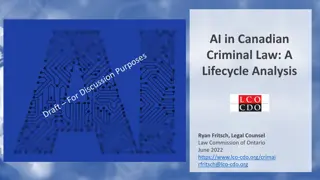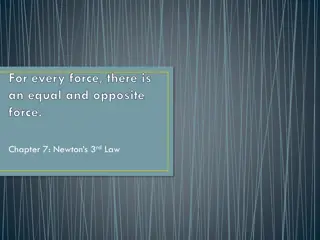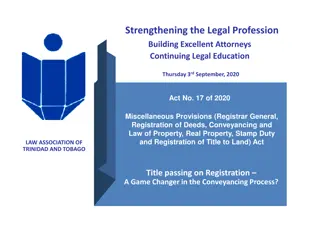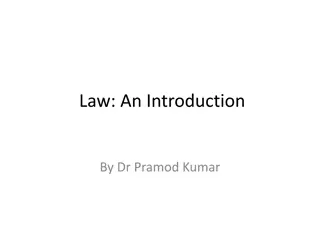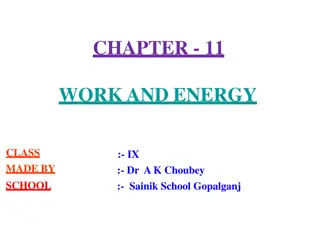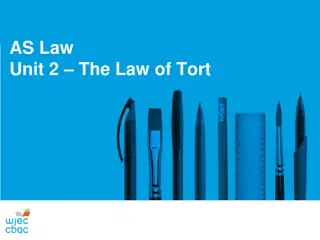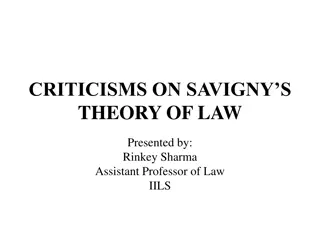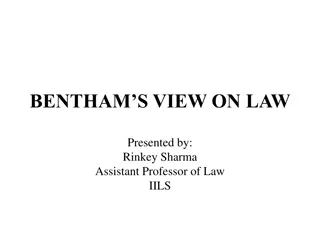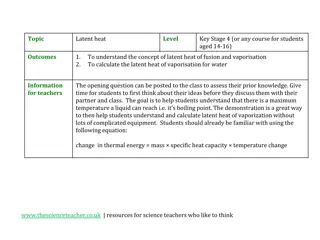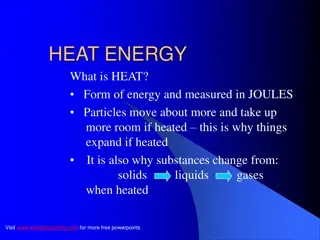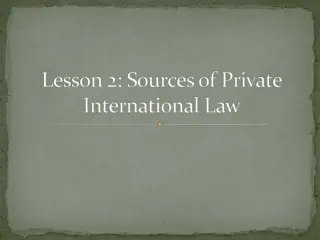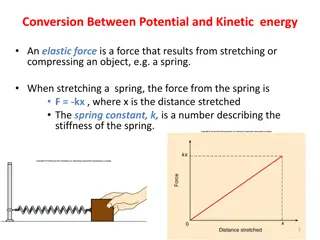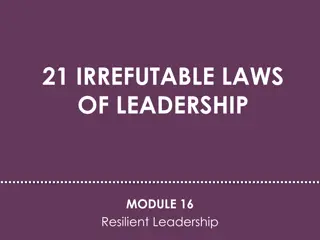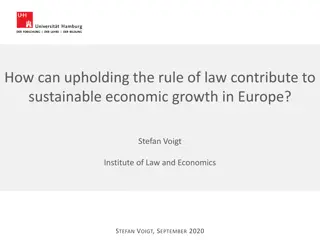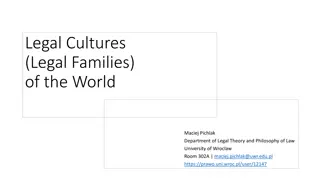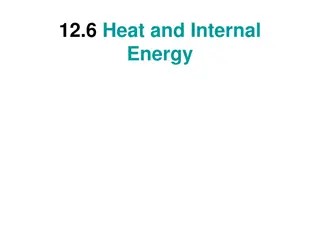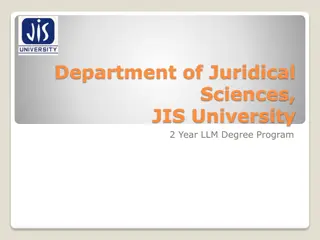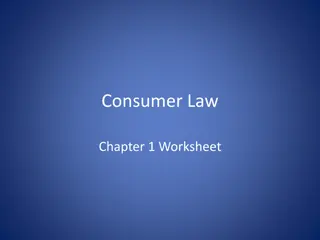AQA Law A Level at City of Norwich School
Explore the comprehensive AQA Law A Level curriculum offered at City of Norwich School, covering topics such as the nature of law, criminal law, tort law, and human rights. Students will delve into the English legal system, learn about various legal principles and rules, study criminal liability and
1 views • 8 slides
Best Comprehensive Legal Services in Chennai?
AEGLE MARMELOS Law Firm:\nComprehensive Legal Services:\n\u2022\tFamily law\n\u2022\tCriminal Law\n\u2022\tCivil Law\n\u2022\tWrits\nFamily Law:\n\u2022\tRestitution of Conjugal Rights: Assisting clients in filing for restitution to resume marital cohabitation when one partner withdraws from the oth
1 views • 4 slides
Konw about our team
Know About Our Team:\nMr.Bageerathan\nMr. Bageerathan is a distinguished legal professional with a rich background spanning over 16 years in the legal field. He earned his Law degree from University Law College and further enhanced his legal acumen by obtaining Dual Masters degrees in Law (LL.M) fro
0 views • 4 slides
AI in Canadian Criminal Law: A Lifecycle Analysis
The Law Commission of Ontario (LCO) is at the forefront of assessing the impacts of AI on civil administrative and criminal law. While Canada has been slower in adopting AI tools compared to other jurisdictions, concerns such as access to justice, due process, and Charter rights are being raised. Th
1 views • 19 slides
Understanding Newton's Third Law of Motion
Chapter 7 delves into Newton's Third Law, stating that every force has an equal and opposite force. The law describes the relationship between forces in an interaction - one force being the action force and the other the reaction force. These forces are equal in strength, opposite in direction, and
0 views • 9 slides
Evolution of Land Law Systems in Trinidad and Tobago
Trinidad and Tobago's land law systems consist of the Common Law System and the Registered Land System. The Common Law system governs unregistered land where title passes upon execution and delivery of the deed. In contrast, the Registered Land System confers ownership upon registration and offers c
0 views • 28 slides
Austin's Theory of Law by Rinkey Sharma: An Overview
Austin's Theory of Law, presented by Rinkey Sharma, delves into the Imperative Theory of Law as proposed by Austin, known as the father of English jurisprudence. It explores General and Particular Jurisprudence, Austin's definition of law, and the elements of positive law, emphasizing the concepts o
0 views • 11 slides
Exploring Energy Stores and Transfers in Science Lessons
Dive into the fascinating world of energy stores and transfers through engaging science lessons. Recall different energy stores, common energy transfers, and create flow diagrams to illustrate energy transfers in various scenarios. Explore gravitational, elastic, magnetic, electrostatic potential en
5 views • 9 slides
Understanding Law: An Introduction by Dr. Pramod Kumar
Law, as explored in "Law: An Introduction" by Dr. Pramod Kumar, encompasses various rules, principles, and systems that regulate human behavior and uphold justice, morality, and order in society. The term "law" holds different meanings across cultures and religions, reflecting diverse legal framewor
0 views • 15 slides
Historical Origins and Formation of German Law: Influence of Roman Law
The historical origins and formation of German law were shaped significantly by the late contact with Roman law during the Medieval and Renaissance period. The weak central imperial power, rising influence of territorial rulers, and the lack of a common legal system in Germany prompted the appeal fo
0 views • 23 slides
Understanding Gas Laws: Boyle's, Charles', Gay-Lussac's, and Avogadro's Laws
Gas laws such as Boyle's Law, Charles' Law, Gay-Lussac's Law, and Avogadro's Law govern the behavior of gases under different conditions. Boyle's Law relates pressure and volume at constant temperature, Charles' Law relates volume and temperature at constant pressure, Gay-Lussac's Law relates pressu
1 views • 19 slides
Evolution of Trust Law in Malta
Malta, with a unique legal system integrating civil and common law concepts, has evolved its trust law over the years. The concept of trust was gradually adopted, culminating in full integration into domestic law post-2004. Recent amendments have further solidified the legal framework, bridging the
4 views • 150 slides
Understanding Work and Energy in Physics
Work is defined as the product of force and displacement, measured in joules. It can be positive, negative, or zero based on the force and displacement directions. Energy is the capacity to do work, with kinetic energy related to motion and potential energy associated with position. Kinetic energy d
3 views • 10 slides
Insights on AS Law Unit 2: The Law of Tort Exam
Detailed feedback on the May 2019 AS Law Unit 2 exam focusing on topics like the Caparo three-part test for duty of care, causation in tort law, and breach of duty of care. The assessment highlights candidate performance, common mistakes, need for relevant case law, and key elements required for a c
0 views • 9 slides
Criticisms of Savigny's Theory of Law and Its Impact on Legal Development
Savigny's theory of law, centered around Volksgeist as the sole source of law, has faced criticisms for overlooking other factors influencing legal development. Critics argue that institutions like slavery were not shaped by Volksgeist but by ruling oligarchies, and Savigny's disregard for legislati
7 views • 4 slides
Understanding the Rule of Law and Legal Systems in Wales and England
The content discusses the nature of law, the Welsh and English legal systems, and the Rule of Law doctrine. It includes observations from the 2019 AS Law Unit 1 examination, emphasizing the importance of adhering to rubrics and answering questions clearly. Candidates faced challenges with timing and
0 views • 14 slides
Bentham's View on Law: Essential Elements and Eight Aspects Explained
Bentham's perspective on law, as presented by Assistant Professor Rinkey Sharma, delves into the definition and essential elements of law according to Bentham. This includes discussing the source of law, its subjects, objects, extent, aspects, force, remedial state appendages, and expression. The es
0 views • 9 slides
Understanding Energy and its Forms in Physics
Energy is the capacity to do work and cause motion, measured in Joules (J). This presentation delves into potential energy (elastic and gravitational) and kinetic energy, explaining their formulas and practical applications through examples and practice questions.
4 views • 39 slides
Contrasting Legal Systems Around the World
Explore the diverse legal families globally, such as Civil Law (Romano-Germanic) and Common Law (Anglo-American), along with their historical backgrounds, sources of law, and dominant ideologies. Delve into the distinctions between Civil Law and Common Law, their origins, development, and practical
0 views • 17 slides
Understanding General Criminal Law: Principles and Relationships
General Criminal Law encompasses rules governing offenses and their penalties, exploring the definitions of offenses, relationships with social sciences, other branches of law, and auxiliary sciences. This presentation covers the importance, sources, and branches of criminal law, highlighting its in
1 views • 230 slides
Exploring Latent Heat of Vaporisation through Demonstration
Students will learn about latent heat of fusion and vaporisation, specifically focusing on calculating the latent heat of vaporisation for water. Through a hands-on demonstration, students will understand the concept that a liquid cannot exceed its boiling point temperature, as energy is used to bre
0 views • 4 slides
Understanding Combined Gas Law and Ideal Gas Law for Final Exam Preparation
Explore the concepts of Combined Gas Law, Boyle's Law, Charles's Law, Gay-Lussac's Law, and their reflection in the Ideal Gas Law. Learn how to solve problems using these laws, prepare for your final exam scheduled for Tuesday, December 12 at 12:30 in the specified room. Dive into in-class practice
1 views • 23 slides
Overview of UK Law: Statute Law, Common Law, Criminal Law, Civil Law
Statute Law is written law created through the parliamentary process, forming the basis of the legal system. Common Law, on the other hand, is unwritten law based on judicial decisions and precedents. They govern different aspects such as civil and criminal matters, each with its unique characterist
0 views • 15 slides
Understanding the Relationship Between Work and Energy
Work and energy are closely related concepts in physics, where work involves the transfer of energy when a force is applied to move an object in the same direction. The equation for work is given by Work (joules) = Force (newtons) x Distance (m), and power represents the rate at which work is done,
0 views • 7 slides
International Law Programs 2021: E-Castle Updates and Course Offerings
Explore the online programs offered by the International Law Programs in 2021 at the E-Castle. Discover the benefits, courses available, program dates, instructor insights, and more. From International Business Law to Public International Law, gain valuable knowledge and networking opportunities in
0 views • 21 slides
Thermochemistry Problem Practice and Solutions
Practice and solutions for thermochemistry problems involving energy calculations, temperature conversions, and phase changes. Includes calculations for melting ice, converting temperature to joules, and determining energy required for heating substances.
0 views • 14 slides
Understanding Heat Energy Transfer and Conduction in Materials
Heat energy is a form of energy measured in joules that causes particles to move faster, expand, and change states. Learn about the difference between heat and temperature, heating and cooling processes, and the methods of energy transfer such as conduction. Discover how materials conduct heat diffe
0 views • 18 slides
The Continuing Relevance of English Law to Irish Corporate Law Reform
English Law remains relevant in Irish corporate law reform, impacting areas like takeover regulation, deferred prosecution agreements, schemes of arrangement, and the comply or explain approach. The influence of English law is seen where there is no EU law dimension or when EU legislation allows mem
0 views • 10 slides
Understanding Private International Law: Key Principles and Treaty Regimes
This lesson delves into the sources, key principles, and treaty regimes of private international law. It covers jurisdictional competence, conflicts of law, recognition of foreign judgments, Canadian common law vs. Quebec civil law, Hague Conventions, and the United Nations Convention on Contracts f
1 views • 14 slides
Understanding Energy Conversion, Power, and Momentum in Physics
Exploring the concepts of energy conversion between potential and kinetic energy, the importance of power in work efficiency, and the role of momentum and impulse in describing motion in physics. The discussion covers elastic forces, work done, power calculations, examples of watt and joules, as wel
0 views • 28 slides
Classification of Law: Understanding Different Types and Functions
Exploring the classification of law is essential for understanding the diverse nature of legal systems. This overview delves into domestic law vs. public international law, public law vs. private law, and the sub-divisions within public law, such as constitutional, administrative, and criminal law.
0 views • 19 slides
Laws of Leadership: Resilient Leadership Module
Explore the 21 Irrefutable Laws of Leadership Module on Resilient Leadership, covering essential principles such as the Law of the Lid, Law of Influence, Law of Process, Law of Navigation, Law of Addition, and Law of Solid Ground. Navigate through phases of leadership growth, learn to add value, bui
0 views • 37 slides
Overview of Legal Systems and Roman Law Development
Legal systems play a crucial role in governing societies, with Roman Law, Common Law, Civil Law, and Religious Law being some of the major types worldwide. Roman Law, focusing on private law, has influenced legal traditions in various regions, especially in Europe. Contrasting Common Law and Civil L
0 views • 26 slides
Upholding the Rule of Law for Sustainable Economic Growth in Europe
Democracy and the rule of law are essential for sustained economic growth in Europe. The rule of law ensures stable and impartial enforcement of rules such as property rights and contract law, key for market economies. Upholding the rule of law is crucial for combating corruption and maintaining a f
0 views • 6 slides
Comparative Analysis of Legal Families Around the World
Explore the diverse legal cultures and families existing globally, including Civil Law, Common Law, Far East, Islamic, Hindu, and more. Learn about the historical background, methods of reasoning, institutions, sources of law, and dominant ideologies that characterize each legal family. Delve into t
0 views • 17 slides
Understanding Heat, Internal Energy, and Specific Heat Capacity
Heat is energy transfer due to temperature differences, measured in joules or calories. Internal energy includes kinetic and potential energies. Specific heat capacity is the heat needed to change temperature. Units like joules, calories, and BTUs are common. Calorimetry is used to measure heat chan
0 views • 13 slides
2-Year LLM Degree Program in Juridical Sciences at JIS University
Explore the 2-year LLM degree program offered by the Department of Juridical Sciences at JIS University, specializing in Corporate Law, Criminal Law, and Constitutional Law. The program covers a range of specializations such as Comparative Criminal Law, Human Rights, Corporate Law, Competition Law,
0 views • 7 slides
Understanding Consumer Law: Enactment and Application of Laws
This comprehensive worksheet delves into the different types of laws such as Constitutional Law, Statutory Law, Administrative Law, Case Law, and Ordinances. It provides insights on who enacts these laws and explores scenarios to determine the type of law that would likely apply. Enrich your knowled
0 views • 19 slides
Japanese Tort Law: Choice of Law Rules and Double-Actionability
Japanese tort law follows specific choice of law rules, determining the applicable law based on factors such as the place of injury, product liability, and defamation. The double-actionability rule ensures that the harmful act is also unlawful under Japanese law and that remedies are available. This
0 views • 14 slides
Understanding Physical Energy Accounts and SEEA for Economic Analysis
Physical Energy Accounts play a crucial role in analyzing energy use in the economy and its impact on the environment. The System of Environmental-Economic Accounting (SEEA) provides a methodology for describing energy flow using national accounts frameworks, including supply-use tables and asset ac
0 views • 18 slides



